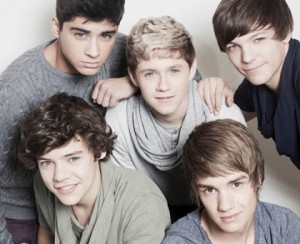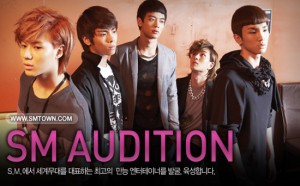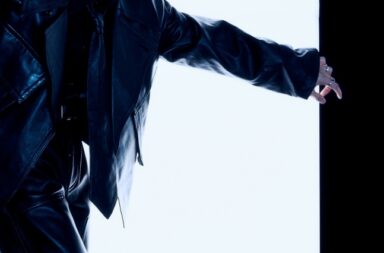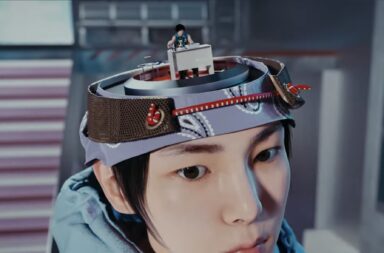 Recently, an overseas act has caught the attention of the entire world, particularly the US. The act takes the form of a group with 5 parts – 5 members, all male – each with their own distinct personalities. The boys have created a huge impact on the American entertainment industry and the entertainment industry in general, having sold out multiple concerts and stolen the hearts of fangirls everywhere. They have a devoted fan base that tracks their every move, and they frequently appear on talk shows to promote their charming personalities. They’ve been given endorsements, as well as TV show appearances, and have recently confirmed a world tour. Everyone in the right demographic has probably at least heard of them or listened to one of their songs, songs that serenade the listener and tells how beautiful they are. But before anyone calls the Hallyu police, I’m (unfortunately) not talking about Big Bang or SHINee or any other K-pop group. I’m talking about the group that’s been the talk of the talk as of late: One Direction.
Recently, an overseas act has caught the attention of the entire world, particularly the US. The act takes the form of a group with 5 parts – 5 members, all male – each with their own distinct personalities. The boys have created a huge impact on the American entertainment industry and the entertainment industry in general, having sold out multiple concerts and stolen the hearts of fangirls everywhere. They have a devoted fan base that tracks their every move, and they frequently appear on talk shows to promote their charming personalities. They’ve been given endorsements, as well as TV show appearances, and have recently confirmed a world tour. Everyone in the right demographic has probably at least heard of them or listened to one of their songs, songs that serenade the listener and tells how beautiful they are. But before anyone calls the Hallyu police, I’m (unfortunately) not talking about Big Bang or SHINee or any other K-pop group. I’m talking about the group that’s been the talk of the talk as of late: One Direction.
One Direction is a British boy band consisting of Niall Horan, Zayn Malik, Harry Styles, Liam Payne, and Louis Tomlinson. A product of British popular singing competition, The X-Factor, they left the competition at 2010, winning third place. Since then, the group signed with X-Factor mentor and popular television personality Simon Cowell’s company Syco Records. The group then released debut single “What Makes You Beautiful” and debut album Up All Night, breaking records and giving them the attention of much of the world. One Direction’s popularity definitely surpasses that of their X-Factor competitors, and the group is still moving forward.
As a member of the age group One Direction caters to, I’ve heard my fair share of the boys. Fellow classmates and friends, even the occasional teacher, frequently discuss them, having conversations that range from latest gossip, to live performances, to little personality quirks, to the desire to have one them as a boyfriend. And sometimes, just to save myself from isolation, I have to join these conversations. But when I do, there is always a familiarity that hits me, a feeling that reminds me that I’ve done this or something like this before. When I watch my friend express jealousy over a girl one of their boys is rumored to be going out with or how hard they laughed after watching a particularly humorous interview, I always ask myself, ‘Where have I see this before? Where have I experienced such behavior and dedication shown by fans in another fandom?’ And then it hits me: K-pop.
Upon further thinking, One Direction exhibits many traits that usually belong to a K-pop boy group. One of these traits I already briefly described: their fandoms. One Direction’s fandom – called Directioners –partakes in activities that are usually signature of K-pop. For example, fans of One Direction tend to actively ship members with each other, a heavily practiced tradition between K-pop fans. This is an extremely rare practice outside of K-pop, and it’s one I wouldn’t expect to have caught on with a Western fan base as I wouldn’t have thought fans to be that open minded. Fans of more effeminate artists generally dislike when someone calls their favorite artists “gay” (we K-pop fans should be aware of the experience), but the majority of the One Direction fandom just seems to laugh over it, acknowledging and finding amusement in the “gayness” of their boys. But the experience isn’t just a one fueled solely by the fans. The members of 1D take part in a lot of bromance, frequently getting touchy-feely between each other. The Harry/Louis ship – Larry Stylinson — is even acknowledged by the artists themselves, reaching levels comparable to famous K-pop ships like EunHae or even YunJae back in the day.
Another thing One Direction’s fans share with K-pop fans is a certain type of devotion to their artists of choice. The devotion displayed goes beyond the devotion showed by regular fans of other artists. Both display the kind of devotion that starts fanwars with fans of a rival group due to a biased comparison, the kind of devotion that makes fans cry after making eye contact with their favorite member, and the kind of the devotion that makes fans feel like they know the artists personally due to knowing so much about them. It’s a kind of devotion that allows fans to look over their favorite artists flaws and see them as perfect, overlooking a lack of talent or any controversies.
And it’s not only behavior that fans of both fandom share; most likely, fans would be in the same demographic as well. One Direction and K-pop boy bands cater primarily to teenage girls, their most loyal followers, using their looks, charms, and voices to get their attention. Consequently, because of the focus on teenage girls, the lyrical content seems of 1D and many K-pop groups seem to be similar as well. I mean compare One Direction’s “What Makes You Beautiful” with a song like SHINee’s “Noona You’re So Pretty.” Both basically describe what every fangirl wants to hear from a boy.
Besides their fandoms , another thing One Direction has in common with K-pop boy bands is the focus on personality and image. Arguably, only half of the experience of following a K-pop group is listening to their music; the other half is spent doting on our favorite idols on interviews or variety shows. When making a K-pop group, it seems like there is just as much focus on personality as there is focus on the actual music of the group. While One Direction’s primary appeal is their music, their personalities still play a pretty critical role in attracting fans as well. The group is witty, charming, and diverse in personality, and the boys seem to showcase that well, with all their TV appearances. And that’s another thing 1D and K-pop groups have in common: they just seem to be everywhere. In Korea, idols are seen and heard practically everywhere. There are countless commercials that feature them, merchandise that surrounds them, and TV shows that frequently feature them as guests. One Direction is also experiencing similar treatment here in the West, being offered TV appearances, endorsements, and merchandise to be made of them.
 And like many K-pop groups, One Direction has a certain artificiality to them, in the sense that these boys did not gather naturally and decided to release music by themselves. One Direction really is a product of a competition — television show X-Factor — just like K-pop groups are products of a company. The boys of One Direction auditioned individually, were assigned together by a group of judges, and were trained to be stars by a mentor all in the process of that competition. Critics of Hallyu think how negatively the West is going to respond dealing with the artificiality of K-pop groups and the whole auditioning/training process, but One Direction virtually went through a similar process – and was broadcasted while doing so – and yet is still accepted by the public.
And like many K-pop groups, One Direction has a certain artificiality to them, in the sense that these boys did not gather naturally and decided to release music by themselves. One Direction really is a product of a competition — television show X-Factor — just like K-pop groups are products of a company. The boys of One Direction auditioned individually, were assigned together by a group of judges, and were trained to be stars by a mentor all in the process of that competition. Critics of Hallyu think how negatively the West is going to respond dealing with the artificiality of K-pop groups and the whole auditioning/training process, but One Direction virtually went through a similar process – and was broadcasted while doing so – and yet is still accepted by the public.
Finally, there’s one more similarity between One Direction and K-pop groups, and that is that One Direction is a group. It might not seem that significant, but it somewhat is due to the whole lack of groups in the West. One Direction is without a doubt, a group, a group of 5 stars with individual talents but with the same label. And despite being a group in an industry that supposedly thought groups were a thing of the past, One Direction was able to gain widespread success. And with One Direction’s success, the West’s interest in groups might finally be rekindled, allowing music groups (including our beloved K-pop groups) to swarm the scene once again. That’s when we should really call the Hallyu police.
I’ve heard multiple times how One Direction fans don’t like to be compared to K-pop fans and K-pop fans don’t like to be compared to One Direction fans. But let’s face it; there’s a lot to compare. They have similar images, concepts, and images. But the comparison isn’t a bad thing. It isn’t as a bad thing at all, since all it does is give evidence of the universality of boy groups. It just shows that a formula that works in the East side of the world can also work in the West. And if the formula really does work in the West, who says a K-pop group can’t make it there? Since if fans are willing to accept One Direction’s artificiality, lack of masculinity, and overall “pop-sy” image, the very things fans fear the West won’t accept, why can’t they do the same for a K-pop group?
(SM Entertainment, OneDirectionMusic.com, OneDirectionVEVO


